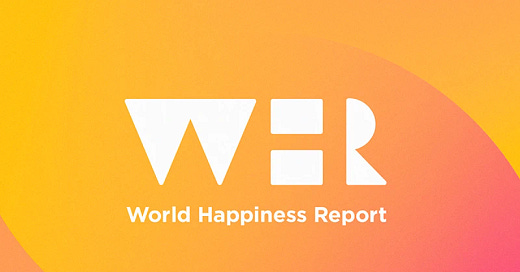Provoked has readers in all 50 US states + 102 countries. To support this work consider upgrading to a paid subscription. You get: (1) the full archives of 100+ posts, (2) early access to research, (3) teaching/workshop exercises, (4) very personal essays, (5) insider info on new books, (5) Q&A forums with me, & more.
Happiness is an elusive beast to tame and study. Even so, there is a broad consensus that some people win the cortical lottery and are more likely to experience happiness, there are great individual differences in happiness that are a function of not just genetics but what happens to people and how these events are interpreted. Also, happiness can be modified through various pharmacological and psychological interventions - though some people respond better than others for predictable reasons.
Here’s the problem: most of our measures of happiness are terrible. If a scientist uses a measure that’s terrible then whatever they discover is null and void.
Case Study
The Oxford Happiness Questionnaire has been cited 2,805 times. In the greatest book on happiness interventions, “The How Of Happiness: A New Approach to Getting the Life You Want,” Dr. Sonja Lyubomirsky suggests that readers take this scale on p. 47. The problem with this widely used, widely touted scale is that it does not separate what happiness is from what causes happiness and what are the consequences of happiness. Just take a look at the items from an article I wrote in graduate school on how to better assess happiness (get it here):
Imagine you wanted to measure happiness. What would you ask? Here are a few things I think you would NOT ask:
Do you think you are hot? I mean, really physically attractive?
How easy is it for you to discover music that is profoundly beautiful and moving?
Listen to this song and try to enter a melancholic mood. It is physically impossible. It is the soundtrack of kids running through sprinklers on a summer afternoon before tumbling down a hill, collecting grass as their torso picks up speed. While this song might induce momentary feelings of joy, the ability to experience these emotions from songs, art, and books does not serve as an effective marker that you are happy.
No. Appreciating beauty has been designated a psychological strength. Aesthetic appreciation is part of the personality trait called Openness to Experience. Also, art therapy is widely used as a psychological intervention to increase happiness.
Mistake the causes and consequences of happiness with what happiness is and you cannot figure out how to intervene. Also, it makes the act of trying to designate which countries are the happiest and unhappiest a silly annual endeavor:

If we care about happiness, precision is important. You cannot improve what you cannot understand.
This is not just about good science. If authors, policy makers, and the general public rely on science, their insights and recommendations are perverted by inadequate science.
Workshop Exercise on Happiness Measurement
Well-being science is what allows us to figure out what works best, for whom, under particular conditions. Measurement is at the core. You must be able to measure what you want to change well or else you cannot adequately determine whether an intervention works and how.
To illustrate the problem of bad happiness measures and the value of good happiness measure, I have a workshop exercise. You can use it with students, practitioners/coaches, and anyone interested in helping humanity.




